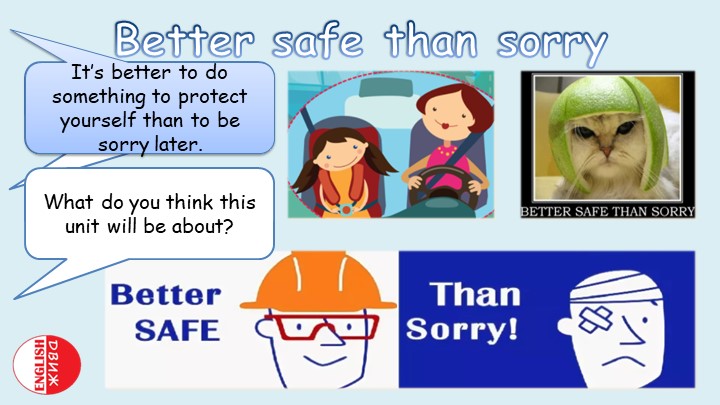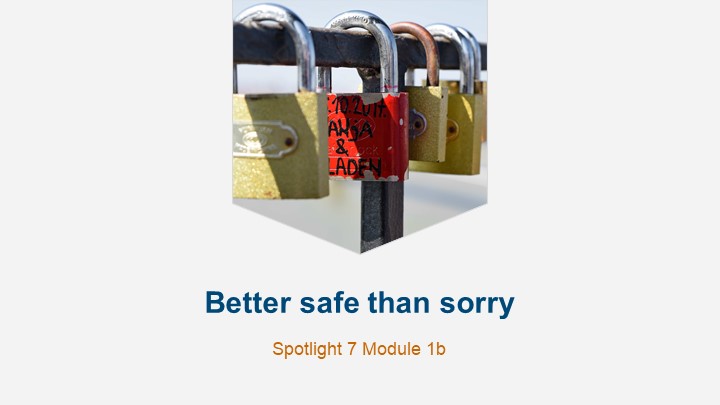Презентация - "Better safe than sorry"

- Презентации / Другие презентации
- 0
- 02.11.24
Просмотреть и скачать презентацию на тему "Better safe than sorry"
Сайт klass-uchebnik.com предлагает качественные учебные материалы для школьников, родителей и учителей. Здесь можно бесплатно читать и скачивать современные учебники, рабочие тетради, а также наглядные презентации по всем предметам школьной программы. Материалы распределены по классам и темам, что делает поиск максимально удобным. Каждое пособие отличается логичной структурой, доступной подачей материала и соответствует действующим образовательным стандартам. Благодаря простому языку, наглядным схемам и практическим заданиям, обучение становится легче и эффективнее. Учебники подойдут как для ежедневной подготовки к урокам, так и для систематического повторения перед экзаменами.
Особое внимание стоит уделить разделу с презентациями - они становятся отличным визуальным дополнением к теории, помогают лучше понять сложные темы и удерживают внимание учащихся. Такие материалы удобно использовать в классе на интерактивной доске или при самостоятельной подготовке дома. Все размещённые на платформе материалы проверены на актуальность и соответствие учебной программе. Это делает сайт надёжным помощником в образовательном процессе для всех участников: школьников, учителей и родителей. Особенно удобно, что всё доступно онлайн без регистрации и в свободном доступе.
Если вы ищете надежный источник для подготовки к урокам, контрольным и экзаменам - klass-uchebnik.com станет отличным выбором. Здесь вы найдёте всё необходимое, включая "Better safe than sorry", чтобы сделать обучение более организованным, интересным и результативным.
Better safe than sorry
What do you think this phrase means?
It’s better to do something to protect yourself than to be sorry later.
What do you think this unit will be about?
What do you think the leaflet is about?
How to protect yourself and your home from burglars!
To look through a peephole
To switch on
To check ID
To leave keys
To fit an alarm system
To install outside lights
Learn new words before reading the leaflet.
To look through
The door chain
To switch on/off
A peephole
An alarm system
To leave sth
To fit
Properly
To install
Dusk to dawn
To check
To break in
To make sure
To put up a fight
To protect
To hand over
Valuables
Robbery
Burglary
Смотреть через
Дверная цепочка
Включать/выключать
Глазок (в двери)
Сигнализация
Оставлять ч-л
Устанавливать
Тщательно
Устанавливать
От зари до зари
Проверять
Вламываться
Убедиться
Затеять драку
Защищать
Передавать из рук в руки
Ценности
VS
Match the underlined words/phrases.
1. give to someone
2. identification
3. a small hole to look through
4. machine that signals danger
5. connect or fix sth in position
6. turned on
Now answer the questions.
What is Jo’s dad doing?
Jo’s dad is installing an alarm system.
What problems do the burglars cause?
The burglars are stealing things from people’s homes.
What advice does Jo give Dan?
Jo advises Dan to tell his parents not to leave his keys near an open window and not to lose them.
Word formation
Read the rule. Then make adverbs from the adjectives: careful, safe, sure, bad.
Mind the spelling.
careful
safe
sure
bad
carefully
safely
surely
badly
Phrasal verb (run)
RUN
out of
into
after
(no more left)
(meet by chance)
(chase)
Use your dictionaries to complete the sentences with the correct phrasal verb. Make your own sentences.
Run out of | run after | run into
Run after
Run out of
Run after
Run out of
Run out of
Run after
Run into
Run into
Run into
1
2
4
3
5
6
7
8
9
Complete the sentences.
Dan ran ……………… Jo on his way home.
He ran …………… milk, so he went to buy some.
The police are running ………… a robber.
Grammar (should/shouldn’t)
Winnie the pooh is ill.
What should he do?
Go to the doctor or go to bed?
He should go to the doctor.
We use should/shouldn’t to give advice.
You are tired. You should have a rest.
You shouldn’t eat so much. It’s bad for you.
Use the phrases to give advice to:
1. A friend who has a splitting headache. (take a painkiller)
I’ve got a splitting headache.
You should take a painkiller.
Use the phrases to give advice to:
2. Your brother who feels tired. (go to bed)
I feel tired.
You should go to bed.
Use the phrases to give advice to:
3. Your sister who’s got a toothache. (see a dentist)
I’ve got a toothache.
You should see a dentist.
Use the phrases to give advice to:
4. A friend who always loses his keys. (keep them in your pocket)
I always lose my keys.
You should keep them in your pocket.
Use the phrases to give advice to:
5. A friend who is nervous about her exams. (not to worry so much)
I’m nervous about my exams.
You shouldn’t worry so much.
Use the phrases to give advice to:
6. Your aunt whose feet hurt. (take off your shoes)
My feet hurt.
You should take off your shoes.
Look at the phrases and the leaflet in Ex. 1. Talk in pairs as in the example.
Что следует мне/нам делать…?
Какой самый лучший способ …?
Как могу я/мы …?
Я думаю/я не думаю, что тебе следует …
Тебе (не) следует ..
Как насчет …?
Почему ты не … ?
To look through a peephole
To switch on
To check ID
To leave keys
To fit an alarm system
To install outside lights
Writing (a leaflet giving advice)
Write a leaflet giving advice on how to protect yourself in the streets. Use ideas from Ex. 6.
To carry a lot of cash
To keep a wallet close to you
To leave expensive items in a car
To walk in well-lit areas
To have a mobile phone with you
Носить много наличных с собой
Держать кошелек рядом с собой
Оставлять дорогие вещи в машине
Гулять по хорошо освещенным улицам
Иметь мобильный с собой
Workbook
Circle the correct word.
Always look through the peephole / chain before you open the door.
Don’t run after / hand over the burglar!
A burglar let / broke into our house yesterday.
He is installing / stealing an alarm system.
Keep your mobile phone switched / fitted on at night.
Form adverbs out of the adjectives in the list to complete the sentences.
Read the leaflet ………………………….
I’m sorry I behaved so ……………………… at your party last week.
Have a nice trip and drive ………………………….
Make sure the lights work ………………………….
Do you ………………………… like living in a big a big city?
I’m ……………………… sorry for being late.
carefully
badly
safely
properly
surely
really
*safe *sure *real *bad *careful *proper
Complete the sentence with the correct phrasal verb.
I tried to ……………………… the thief, but he was too fast for me.
Did you ……………………… Mr Jones the other day?
Oh, no! The guests will be here in a minute and we are ……………………… of coffee.
run into
run after
run out
run after
run into
run out
Someone took Matt’s wallet. Help Matt be more careful. Use the phrases to give him advice.
carry a lot of money with you
use a belt bag
keep your wallet in your back pocket
be careful in crowded places
1. You shouldn’t keep your wallet in your back pocket.
2. You should be careful in crowded places.
3. You shouldn’t carry a lot of money with you.
4. You should use a belt bag.
Choose the correct response for each question.
1
A: What’s the best way to avoid pickpockets?
B:
a. You should look after your wallet.
b. Don’t be so silly!
2
A: How about joining Neighbourhood Watch??
B:
b. I didn’t think of that.
a. Really?
3
A: How can we protect our home?
B:
b. Walk in well-lit places.
a. Why don’t you fit an alarm system?
2
A: What should we do before we leave the house?
B:
b. You should lock all the doors.
a. You should fit an alarm system.



























